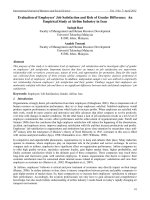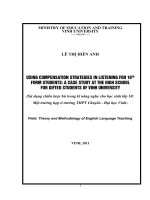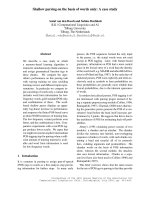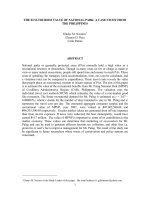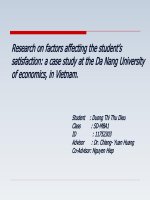THE ROLE OF TIME MANAGEMENT SKILLS IN FULFILLING ASSIGNMENTS OF RESEARCH METHODOLOGY SUBJECT OF SENIOR STUDENTS – A CASE STUDY AT TRA VINH UNIVERSITY
Bạn đang xem bản rút gọn của tài liệu. Xem và tải ngay bản đầy đủ của tài liệu tại đây (134 KB, 9 trang )
<span class='text_page_counter'>(1)</span><div class='page_container' data-page=1>
<b>THE ROLE OF TIME MANAGEMENT SKILLS</b>
<b>IN FULFILLING ASSIGNMENTS OF RESEARCH</b>
<b>METHODOLOGY SUBJECT OF SENIOR STUDENTS –</b>
<b>A CASE STUDY AT TRA VINH UNIVERSITY</b>
Nguyen Thi Ngoc Van1, Truong Thi Thanh Ngan2
<i><b>Abstract – Time becomes a greatly </b></i>
<i>es-sential factor and time management skill is</i>
<i>more important to students’ lives, study and</i>
<i>especially in Research Methodology subject.</i>
<i>Realizing that, this research aims to study</i>
<i>the relationship between time management</i>
<i>and performance on Research Methodology</i>
<i>subject, specifically to find out techniques</i>
<i>which students use to fulfil in assignments of</i>
<i>this subject. Questionnaires including </i>
<i>ques-tions related to students’ perspectives on time</i>
<i>management skills and the factors affecting</i>
<i>the relationship between time management</i>
<i>and Research Methodology subject were </i>
<i>de-livered to sixty senior students. The findings</i>
<i>show the roles, as well as the effects of</i>
<i>time management on assignment fulfilment,</i>
<i>were confirmed. Most of the participants</i>
<i>agreed that time management skills played</i>
<i>an essential role in their ability to complete</i>
<i>assignments of the subject. And the study also</i>
<i>provides students with some effective time</i>
<i>management techniques for their successful</i>
<i>study.</i>
<i><b>Keywords: assignment fulfilment, </b></i>
<i><b>tech-niques, time management skills.</b></i>
I. INTRODUCTION
For decades, Orlikowski & Yates [1]
ob-served that developing global competition,
1
School of Foreign Languages, Tra Vinh University
2
Student of School of Foreign Languages, Tra Vinh
University
Email:
Received date: 26thJuly 2019; Revised date: 12th
Au-gust 2019; Accepted date: 16th May 2020
exponential increases in the speed of
comput-erizations, telecommunications, and meeting
the command of the availability and
immedi-acy of products and services have played into
a resurgence of interest in time and timing.
Most people know the impact of time,
and its importance, on our lives but some
hardly manage time well because of different
influential factors. Britton & Tesser [2]
be-lieved that time management has certain
ef-fects on educational achievement. However, a
correlation between time management skills
and academic accomplishments is equivocal,
Swart et al. [3].
The School of Foreign Languages
in-troduces Academic Writing and Research
Methodology (RM) for students to get
fa-miliar with how to conduct scientific
re-search. From the two subjects, students are
equipped with basic knowledge on principles
about RM, they can research on their own.
However, students could not submit
assign-ments of RM on time due to lack of time
management skills, or sometimes that makes
students lead to time mismanagement, poor
sleep patterns, and increased levels of stress,
Hardy [4]. As a result, time management
is widely considered a vital factor requiring
students to manage their study effectively.
</div>
<span class='text_page_counter'>(2)</span><div class='page_container' data-page=2>
management skills for successfully fulfilling
assignments of this subject.
The research aimed to answer two
ques-tions:
- What is the relationship between time
management skills and finishing the RM’s
assignments?
- What techniques are used by students to
finish the assignments of RM on time?
II. LITERATURE REVIEW
<i>A. Theoretical background</i>
<i>1) Definition of Time Management:</i> In our
modern society, time is considered one of the
most priceless resources, time management
can be seen as an indispensable skill for both
studying and working. As noted by
Zam-petakis, Bouranta, Moustakis [5], “Broadly
speaking, time management refers to
activ-ities that imply an effective use of the time
that is deemed to facilitate productivity and
alleviate stress”. In other words, time
man-agement is managing our time effectively to
improve work productivity. It means that we
waste no time to finish the goal but it still
fulfils all the tasks fully. As stated by Ahma
et al [6] in their study that time management
is the principle of any successful event. They
also emphasized that “time management is
the act or process of planning and exercising
conscious control over the amount of time
spent on specific activities, especially to
in-crease effectiveness, efficiency or
productiv-ity”. So, time management is also seen as the
art of time arrangement. Time management
initiates one of the most regular topics
dis-cussed in learning and study, in the courses
and plenty of handbooks on study skills.
Ac-cording to Indreicaa, Cazanb, Trut¸ac [7], time
management becomes necessary for every
student. In line with the statement, MacCann
et al. [8] considered that time management
is an intimate key to educational attainment.
Also, time management is one of the two
significant elements relating to the
creativ-ity of each person, Zampetakis et al. [6].
Specifically time attitude, time management
includes daily planning and confidence in
long-range planning that have an interaction
toward individual creativity. Time
manage-ment is only an important factor of
suc-cess but a difficult skill. To have good time
management skills is not a straightforward
process for everyone, especially for students.
<i>2) Importance of time management:</i>
Ac-cording to Mancini [9], efficient time
man-agement can decrease pressure at work.
Moreover, it has a strong effect on daily life,
so in people’s learning, time management
is not necessary. Proper time management
is a critical factor to success in the college
study environment. Similarly, Van de Meer
et al. [10] described that time management
has a strong effect on the transition from
high school to the university environment.
In high school education, teacher and
on-class attendance have a closed relationship to
students’ learning outcomes but in university,
their study results come from themselves
primarily. Students spend more time
self-studying at home or at the library for
refer-ence materials to support the study than
sit-ting in classrooms. Their academic subjects’
results come from their hard-working efforts.
Therefore, students have to plan their time to
balance their study and life.
<i>3) Factors affecting time management:</i>
Time management skills are the necessary
skills to be obtained. Any person can train
and use those skills, however, being a
suc-cessful time manager is not easy because it
can be affected by various factors, both
exter-nal and interexter-nal. Exterexter-nal factors include task
providers, unexpected incidents, tools. . . and
internal ones are expected to be (planning
skill, work division, work strategically). In a
study by Ozsoy [11], he explored that gender
and work do not affect time management
skills. It means that whether a person is male
or female, or what his job does not appear to
relate to his time management skills.
</div>
<span class='text_page_counter'>(3)</span><div class='page_container' data-page=3>
rate of time management. The instructor
gives assignments or tasks and they set up
the time for each assignment. In some cases,
instructors provide appropriative strategies
for the given tasks. However, how time is
spent depends on task receivers’ attitudes
such as going to the library regularly and
keeping the regular speed on working, Swart
et al. [3]. Additionally, time managers’
atti-tude is the cause leading to procrastination.
According to Mancini [9], procrastination is
defined as the main cause of work delay. It
comes from many different roots but most
of them are internal factors. Particularly, he
shows eight factors. First, one of the common
reasons, task receivers think that the task is
difficult and vast and they do not want to
do it. They think the task is complex and
overloading in comparison with their ability.
Next, if doing a task without planning, it
will affect the result of the task seriously. A
plan with an instructional role should keep
things on track. Besides that, setting a goal
is a compulsory step to avoid wandering. It is
important to determine what the goal of the
task is and how to approach it. Sometimes,
in the journey to attain the goal, we have to
adapt to complete each small part. Perhaps
our change will be better or worse but we
can try and do it right one more time. Being
afraid of changing and making mistakes is
not a quality of successful time-manager.
Then, people usually want to complete many
things but they pay insufficient attention to
time. In some cases, a lot of work and a little
time will make people feel stressed. They are
under pressure of being an excellent person,
so they undertake a lot of work and try to
solve them as soon as possible. After a long
period, cramming will lead to excessive stress
and have a bad effect on both their work
and personal life. It means that their time
management is unsuccessful.
<i>4) Techniques and tools to improve time</i>
<i>management:</i> Managing time is considered
a professional ability. People can improve
their ability at any time if they want to get a
high result in their job. From a similar
view-point, it was indicated that time management
skills can be trained. There is an
intercon-nection between time management and
aca-demic achievement. Accordingly, using time
managing training programs could practically
result in improving academic achievement,
especially for poor time managers There are
several techniques as tools to improve time
management skills but each person needs to
find their time management style (Mancini
[9]). As Mancini’s thoughts, every individual
is unique, so there is no fixed time
man-agement style for all. For that reason,
bas-ing on the feature of the job, characteristic,
living environment, etc., each one needs to
find their time management style to attain
effective achievement.
For example, Mancini [9] mentioned
pro-crastination as a hindering factor. Besides,
he revealed not only eight factors leading
to procrastination but also solutions for the
factors. According to him, each factor leading
to procrastination has each strategy to solve
it. For example, if the task seems massive,
you can divide into small parts and complete
one by one. Depending on the task and its
difficulties, it will have solutions to fit each
one.
</div>
<span class='text_page_counter'>(4)</span><div class='page_container' data-page=4>
<i>B. Related studies</i>
Britton & Tesser [2] carried out a study
to analyze the effectiveness of time
man-agement in the class of students at the
Institute for Behavioral Research and
De-partment of Psychology University of
Geor-gia. Ninety college students completed a
time-management questionnaire in 1983, and
their high school Scholastic Aptitude Test
(SAT) scores were got from college records.
Principal-components analysis of the
35-item time-management instrument revealed
3 components. 4 years later, each student’s
cumulative grade point average was obtained
from college records. The analysis showed
that time management was a significant
pre-dictor of cumulative grade point average and
accounted for more variance than did SAT
scores. It is concluded that time-management
practices may influence college achievement.
Compared to this “Time management skills
on assignment fulfilment of RM subject”,
the final result is also similar and time
management affects students’ achievement in
general.
In a study in 2009, Swart et al. [14]
researched whether time management skill
affects the academic success of African
en-gineering students or not. The research used
the imperial study with incorporated an
ex-post-facto study involving experimental and
exploratory design using descriptive statistic.
The results of this research indicated that
there was no statistically significant
connec-tion between time management skills and the
academic achievement of African
engineer-ing students. However, authors gave some
effective tools (eight tools in particular) for
students to improve time management.
In the study of by Adams and Blair
[15], the self-reported time management
be-haviours of undergraduate engineering
stu-dents using the Time Management
Behav-ior Scale was examined. The research used
analysis of correlation, regression, and model
reduction to attempt to determine aspects
of time management the students practised,
time management behaviours strongly
associ-ated with higher grades within the program,
and whether or not those students who
self-identified with specific time management
be-haviours achieved better grades in the
pro-gram. The findings of the research showed
that students’ perceived control of time was
the factor that correlated significantly with
cumulative grade point average and it was
found that time management behaviours were
not significantly different across gender, age,
entry qualification, and time already spent
in the program. However, the research also
found many students recognized that they
found it difficult to have a balance between
their studies and daily lives.
Besides, Razali et al. [16] conducted a
study to determine the relationship between
the time management and academic
achieve-ment of the students. The research used
questionnaires to find out the result. The
result found that all the time management
be-haviours are significantly positively related to
academic achievement of students although
the relationship is weak. Meanwhile, time
management is very important and it may
af-fect an individual’s overall performance and
achievements. Three factors associated with
time management which can be classified
as time planning, time attitudes and time
wastage were discovered. The final result also
indicated that there was no significant
differ-ence between time management behaviours
and gender and races and time planning is the
most significant correlated factor to academic
achievement.
</div>
<span class='text_page_counter'>(5)</span><div class='page_container' data-page=5>
stu-dents’ time management subscales means
scores and academic success according to
status, grades, parents and programs.
III. METHODOLOGY
The research was examined to explore the
relationship between time management and
RM subject and discover techniques which
students use to finish tasks assigned by
teach-ers of RMs on time.
The participants of the research were 60
senior students who study English major.
They have finished the main subjects of the
training program of Tra Vinh University for
English major students. They also have just
finished Research Methodology subject in
the previous semester. Although they come
from the same class, they attend different
Research Methodology class with different
teachers.
The research instrument is a questionnaire.
The questionnaire has 15 items divided into
three main parts: students’ perception of time
management, factors affecting students in
managing time to fulfil assignments of
Re-search Methodology subject and techniques
that students can use to improve time
man-agement on fulfilment assignment of
Re-search Methodology subject. The questions
from 01 to 05 are a five Likert-type scale
and the remaining questions are multiple
responses.
Researchers created a questionnaire
in-cluding 15 items in total. The questionnaires
were given to 60 senior English majors who
were the main participants of this study. The
researchers explained the questionnaire to the
participants and went back to collect the
questionnaires. It took us around 20 minutes.
The questionnaire of the research had two
types of questions and the researcher used
IBM SPSS statistics 20 to analyze the data.
After that, each question was analyzed to get
descriptive statistics of each one. The figures
from descriptive statistics became
meaning-ful data toward this research
IV. DATA ANALYSIS
This analysis began with the students’
per-ception of time management. The authors
want to identify whether students think that
time management has any relationship to RM
subject. There are four questions. They were
designed to learn how the students know
about time management.
First, the importance of time management
skill was answered. Besides, in their opinion,
teachers or students will need time
man-agement skill in a university environment.
Simultaneously, from the questionnaire, the
authors also found out the level of students’
time management skill.
Table 1: The overall mean of students’
per-ception towards time management
N Minimum Maximum Mean Std.
Deviation
Perception
mean 60 3.00 4.40 3.8067 .34732
Valid N
(listwise) 60
<i>(Source: Authors’ survey, 2019)</i>
</div>
<span class='text_page_counter'>(6)</span><div class='page_container' data-page=6>
fulfill-ing the assignments of the Research
Method-ology course. This result was relatively close
to the studies of Nadinloy et al. [2], Adams
et al. [15] and Razali et al. [16] that the time
management skill played an important role in
students’ academic achievement. According
to three studies, most students agreed that
time management skill has a stable position
in their study careers. However, this research
focused on the especially subject of the
course- Research Methodology. Therefore,
being compared to three above research, this
research was a new topic to be found out with
a specific subject- RM subject, not academic
achievement generally. Moreover, it was also
completely different with the final results of
the research Swart et al. [14]. In the study
of Swart et al. [14], there is no relation
be-tween time management skills and academic
achievement, but in this research, there is a
relationship between time management and
academic of RM subject.
In the first item of Table 2, the importance
of time management skill is surveyed. It is
obviously seen that most of the participants
agree that time management skill is an
es-sential skill (M=4.63, SD= 0.517). However,
numerous of them admit that time
manage-ment skill is not their strong skill.
Looking at three next items in Table 4.2,
those items relate to candidates who help
students improve time management skill.
Among those candidates, “yourself” reaches
the highest position in comparison with the
two remaining ones – “family” and “teacher”
(M=4.7, SD=0.645). Firstly, according to
the findings of this study, the participants
thought arranging time was an extremely
im-portant factor in the Research Methodology
subject. Secondly, the responsibilities of each
member in their group also influence the
completion of assignments of the Research
Methodology course. Thirdly, assignments of
other subjects contribute to the pressure to
fulfil the assignment of Research
Method-ology subject. Sometimes, they fail to deal
with the pressure of completing other
assign-ments.
Findings of this research are both in line
with and contradict to other previous
stud-ies of Adams et al. [15] and Razali et al.
[16]. Similar to studies Adams et al. [15],
Razali et al. [16], this research also found
that there was no relation between the time
management with races, genders or even
ages of students. Meanwhile, the research
[16] showed three factors affecting students’
academic achievement, time-planning, time
attitudes and time wastage. Among those
fac-tors, time planning shared a similarity with
the result of this research was that “time
arranging”. The results of this research had
responsibilities of members, pressure from
other subjects’ assignments and others and
families which are different from Razali et
al. [16]. Likewise, the research of Adams
et al. [15] also concluded that the students’
perceived control of the time factor was
generally related to the cumulative average
grades of students.
From Table 3, arranging time has a strong
effect on assignments fulfilment of Research
Methodology subject. It has the highest
per-centage at 32.6% while the responsibilities
of each member in groups and pressure of
assignments of other subjects indicate lower
rates at 28.4% and 25.5%, respectively.
Some techniques that can help students
improve time management to fulfil the
as-signments of Research Methodology subject
were suggested. Foremost, planning and
set-ting goals for all affairs are indispensable
techniques. The two techniques are a detailed
plan as well as a strategy for each affair.
The participants choosing these techniques
believe that goal is an important point in the
whole process of doing anything. Because of
that, planning and setting goals play the role
of a guiding light. Students have to try to
approach the goal as soon as possible.
</div>
<span class='text_page_counter'>(7)</span><div class='page_container' data-page=7>
Table 2: Descriptive Statistics of students’ perception of time management
N Minimum Maximum Mean Std. Deviation
Time management is an important skill 60 3.00 5.00 4.6333 .51967
Your time management is good 60 2.00 5.00 3.0667 .86095
You can help yourself to improve time management skill 60 2.00 5.00 4.7000 .64572
Your family can help you to improve time management skill 60 2.00 5.00 3.2167 .78312
Your teachers can help you to improve time management skill 60 2.00 5.00 3.4167 .78744
Valid N (listwise) 60
<i>(Source: Authors’ survey, 2019)</i>
Table 3: The factors affecting students in
managing time to fulfil the assignments of
Research Methodology subject
<b>Responses</b> <b>Percent of</b>
<b>Cases</b>
<b>N</b> <b>Percent</b>
Factors
Arranging time 46 32.6% 76.7%
Responsibilities of each
member in groups 40 28.4% 66.7%
Pressure of assignments
of other subjects 36 25.5% 60.0%
Influences from family
and other relations 19 13.5% 31.7%
<i>(Source: Authors’ survey, 2019)</i>
effectively. An appropriate time slot can
in-crease work productivity. For instance, many
people’s productivity is increased when they
work in the morning but in the afternoon
or the evening, they usually procrastinate the
task.
Another technique is promising a reward
or a gift for themselves. Participants support
the opinion that students promise a reward
for themselves when they reach settle goals.
Most of people love gifts or rewards, so this
will motivate them to try to do their best
to get a better result. All of those factors
above were different from the research by
Gayef et al. [17], and are also the new ways
for students to succeed in their assignment
during the Research Methodology subject.
Importantly, the research Gayef et al. [17]
mentioned the most important techniques
to be good at time management was the
awareness of students’ attitudes, planning
and thinking behaviours. Similarly, this study
suggested that arranging and carrying out
the affairs based on priority order, planning
and setting goal for all affairs are the most
suitable solution for most university students.
V. TECHNIQUES THAT CAN HELP
STUDENTS TO IMPROVE TIME
MANAGEMENT
Table 4.4 describes some techniques that
can help the students improve time
manage-ment on fulfilmanage-ment the assignmanage-ment of
Re-search Methodology subject. The technique
holding the highest proportion is planning
and setting goals for all affairs (23.6%).
Simi-larly, arranging and carrying out affairs based
on priority order is the second highest one,
making up 22.3% of participants’ choices.
Besides, the three techniques having a quite
close rate are creating a schedule for the
whole week, sketching out a to-do list and
feasible time for each affair and choosing the
time slot in the day that can achieve high
ef-fective working productivity (16.9%, 16.2%
and 14.2%, respectively). Lastly, promising a
reward/ a gift for yourself when fulfilling the
deadline is the lowest item (6.8%).
</div>
<span class='text_page_counter'>(8)</span><div class='page_container' data-page=8>
make a plan for the whole week. After having
a plan for a week, sketching out a to-do list
is a needful step. Sketching out the list helps
students remember what they will do in a day
and control all the things in the day easily.
VI. CONCLUSION AND
RECOMMENDATIONS
<i>A. Conclusion</i>
This research has aims to discover the
re-lationship of time management skills in fulfil
assignments of RMs and some techniques
help students summit tasks on time. The
participants are 60 last-year English majors
at Tra Vinh University. The 15 item-
ques-tionnaires were used to collect data.
Findings from this research both
con-firmed the results found by other researchers
and introduced some interesting knowledge
to the area of research. First of all, among
the factors affecting fulfilment assignments
of Research Methodology subject, arranging
time is the most common factor. The
re-sponsibility of each group member plays a
vital role in the whole process of the course.
Besides, the study also revealed that
assign-ments of other subjects also directly effect on
fulfilment assignments of Research
Method-ology subject. After determining those
fac-tors, the researchers believed that some
tech-niques such as planning and setting goals for
all affairs, arranging and carrying out the
affairs basing on priority orders, creating a
schedule for the whole week, sketching out
to-do lists and feasible time for each affair,
choosing the time slot in the day not only
can help students improve time management
toward the Research Methodology subject but
also beyond that area.
<i>B. Implications and recommendations of the</i>
<i>study</i>
This study is dedicated to students who
will study the Research Methodology subject.
It can be seen from the findings of this study
that time management skill not only affects
students’ performance in the RM subject but
also helps students achieve good results in
this subject. First, students need to determine
the factors hindering the process of learning
this subject. After identifying the problem,
students need to solve the problem as soon as
possible and thoroughly. Another important
step, students need to know how to manage
their time. Moreover, it is necessary to
ar-range a time for each task, each problem to
ensure that they do not affect each other, in
particular, do not affect their learning.
Besides, students should apply some
tech-niques that help them improve their time
management skills to complete assignments
on time which were given in the
question-naires and discussed. The students attending
this research agreed that the techniques are
effective to them, so the students have learnt
and will learn Research Methodology subject
completely can use it in their research in the
future. Finally, if students are not able to train
their time management skills by themselves,
students can join skill clubs or time
manage-ment courses. It will be a good environmanage-ment
for students to practice and develop their
time management skills as well as become a
skilful time manager in their study and life.
To teachers, they had better have specific
teaching plans which are suitable for each
group of class of this subject. Due to
capac-ities of students in the groups and conditions
of classrooms, teachers as the planners create
suitable and flexible activities and
assign-ments to help them improve and complete
their assignments in time and have better
time-management skills. At the same time,
teachers should take careful consideration of
the useful techniques which are suitable for
each of the students.
</div>
<span class='text_page_counter'>(9)</span><div class='page_container' data-page=9>
Table 4: Techniques that can help students to improve time management
<b>Responses</b> <b>Percent of</b>
<b>Cases</b>
<b>N</b> <b>Percent</b>
Techniques
Creating a schedule for the whole week 25 16.9% 41.7%
Planning and setting goal for all affairs 35 23.6% 58.3%
Arranging and carrying out the affairs based on the priority order 33 22.3% 55.0%
Sketching out the to-do list and feasible time for each affair 24 16.2% 40.0%
Choosing the time slot in the day that can achieve high effective working productivity 21 14.2% 35.0%
Promising a reward/ a gift for yourself when fulfilling the deadline 10 6.8% 16.7%
<i>(Source: Authors’ survey, 2019)</i>
able to adjust their study abilities to each
sub-ject suitably or make them adapt with
study-ing environment. Likewise, further research
could be conducted on the relationship
be-tween time-management skills and students’
future employabilities to make students have
a clearer on job-orientation at university.
REFERENCES
[1] Orlikowski W J, Yates J. It’s about time: Temporal
<i>structuring in organizations. Organization Science.</i>
2002;16(3):684–700.
[2] Britton B K, Tesser A. Effects of time-management
<i>practices on college grades. Journal of educational</i>
<i>psychology</i>. 1991;83(3):405–410.
[3] Nadinloyi K B, Hajloo N, Garamaleki N S,
Sadeghi H. The study efficacy of time management
training on increase academic time management of
<i>students. Procedia-Social and Behavioral Sciences.</i>
2013;84:134–138.
[4] Hardy L. Helping students de-stress. <i>Education</i>
<i>Digest</i>. 2003;68(9):10–17.
[5] Zampetakis L A, Bouranta N, Moustakis V S. On
the relationship between individual creativity and
time management. <i>Thinking skills and creativity</i>.
2010;5(1):23–32.
[6] Ahmad N L, Yusuf A N M, Shobri N D M, Wahab S.
The relationship between time management and job
<i>performance in event management. Procedia-Social</i>
<i>and Behavioral Sciences</i>. 2012;65:937–941.
[7] Indreica E S, Cazan A M, Truta C. Effects of
learning styles and time management on academic
achievement. <i>Procedia-Social and Behavioral </i>
<i>Sci-ences</i>. 2011;30:1096–1102.
[8] MacCann C, Fogarty G J, Roberts R D. Strategies
for success in education: Time management is more
important for part-time than full-time community
<i>col-lege students. Learning and Individual Differences.</i>
2012;22(5):618–623.
[9] <i>Mancini M. Time management. The McGraw-Hill</i>
Companies; 2003.
[10] Van der Meer J, Jansen E, Torenbeek M. It’s almost
a mindset that teachers need to change: first-year
students’ need to be inducted into time management.
<i>Studies in Higher Education</i>. 2010;35(7):777–791.
[11] Ozsoy D. University students’ in the Examination of
<i>Skills and Attitudes of Time Management. </i>
<i>Procedia-Social and Behavioral Sciences</i>. 2014;152:358–361.
[12] Chase J A D, Topp R, Smith C E, Cohen M Z,
Fahrenwald N, Zerwic J J, et al. Time management
<i>strategies for research productivity. Western Journal</i>
<i>of Nursing Research</i>. 2013;35(2):155–176.
[13] Alexander R, Dobson M S. <i>Real-world time</i>
<i>management. American Management Association</i>.
EPA/444/4-89-001. U.S. Environ. Prot. Agency,
Washington, D.C; 2009.
[14] Swart A J, Lombard K, de Jager H. Exploring the
relationship between time management skills and the
academic achievement of African engineering
<i>stu-dents–a case study. European Journal of Engineering</i>
<i>Education</i>. 2010;35(1):79–89.
[15] Adams R V, Blair E. Impact of Time Management
Behavior on Undergraduate Engineering Students’
<i>performance. Sage Open Original Journal-Creative</i>
<i>Common CCBY</i>. 2019;9(2):1–11.
[16] Razali S N A M et al. Impact of Time Management on
<i>Students’ Academic Achievement. Journal of Physics.</i>
2017;995(1):12–42.
</div>
<!--links-->
